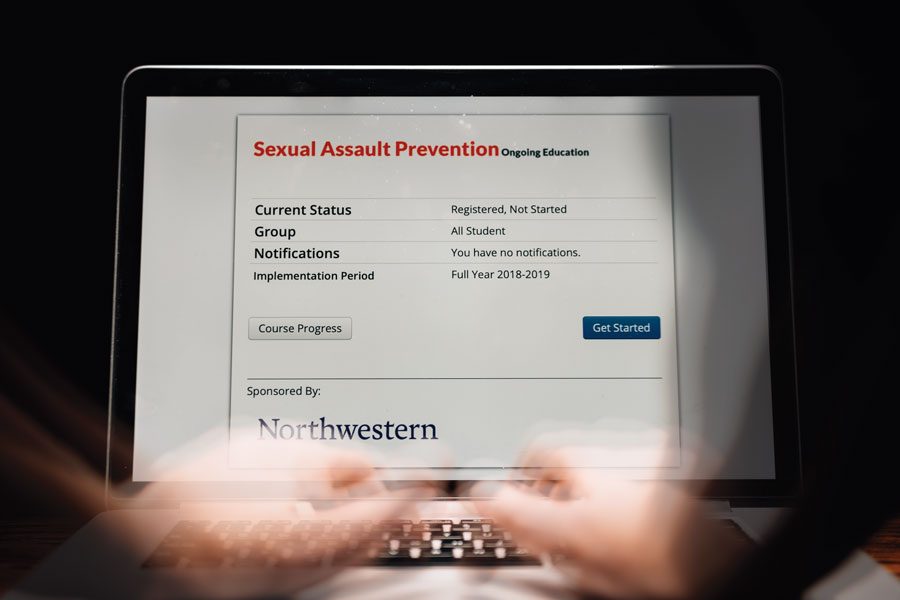Students say University sexual misconduct training is ineffective, doesn’t change behavior
Noah Frick-Alofs/Daily Senior Staffer
The University’s new sexual assault prevention training. The Office of Equity rolled out the training in January.
February 3, 2019
Some Northwestern students are reacting negatively to the University’s online sexual misconduct training, saying it’s insufficient for teaching students how to combat sexual harassment and violence.
The training, rolled out Jan. 23, includes definitions of important terms and links to state laws and University policies and takes students through hypothetical situations. In a January email, the Office of Equity presented the training as new, comprehensive and necessary for combating sexual misconduct and violence on campus.
Now, almost two weeks after the training became available, some students are saying it’s not as effective as the University claims.
Communication junior Jillian Gilburne thinks online trainings are inadequate for conveying strategies for improving the climate on campus. Students could ignore the message of the training and not read the policies, she said.
“It says ‘learn about Northwestern policy’ and you click on a link that opens a PDF of the Title IX policy that’s 36 pages long,” Gilburne said.
The modules in the training are also easy to skip through, said McCormick sophomore Spencer Colton, which is a function of doing trainings like this online. The audio can be muted, and students can click “next” without having actually read any of the information provided.
Because the content of the training could be potentially upsetting for students with personal experience with sexual harassment or violence, the Office of Equity allows students who may feel uncomfortable to opt out by contacting the office, said Colleen Johnston, the University’s Title IX coordinator. “The Office will work with the student to provide support and accommodations – including excusing the student from the training.”
The Office of Equity “did consider the possibility” that students might take advantage of the policy, Johnston said, but decided that the benefits “outweigh any potential concerns.”
Though Gilburne was skeptical of the training’s actual effects on campus climate, she said that people skipping the training altogether made her uneasy.
“I didn’t even realize people might exploit it like that,” she said. “I understand that the University is walking a tricky line, but it’s problematic if you can just email them and say, ‘I don’t want to do it.’”
Both Gilburne and Colton believe that in-person trainings — such as those done by Sexual Health and Assault Peer Educators — are much more effective in decreasing instances of sexual misconduct.
Gilburne recently completed a SHAPE training with a student group and thought the atmosphere of “friends just talking to friends” made learning about combating sexual violence a good experience. She added that while she thinks it’s something “everyone should do,” she doesn’t know how the University would mandate in-person trainings the way they do with the training online.
The Office of Equity offers free in-person trainings for University faculty, staff and students and can be scheduled through the office. The training is only one piece of an outreach strategy designed to provide “ongoing education,” Johnston said.
Though Gilburne doesn’t know how she would change the process either, she said the training feels like empty gesture by the University to decrease liability — and that it probably doesn’t work.
“Ultimately, what we have is this learning tool that people are clicking through, passively listening to and not learning from,” Gilburne said. “The University gets to check a box that says people were educated, but I don’t think it actually influences anyone’s behavior.”
A previous version of this story mischaracterized how trainings can be requested through the Office of Equity. Trainings can be requested by contacting the office. The Daily regrets the error.
This story was also updated to better reflect the process of opting out of the online training with the Office of Equity.
Email: cameroncook2021@u.northwestern.edu
Twitter: @cam_e_cook
Related Stories:
– Mandatory sexual misconduct training to roll out later this month
– University received at least 81 accusations of sexual misconduct policy violations in 2017



